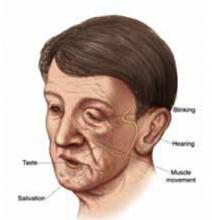PATIENT INFORMATION
What is Bell’s palsy?
Weakness and slumping on one side of the face are common features of this condition in which the nerve controlling the face has been injured. Other symptoms are:
- Inability to move affected side of the face
- Drooping mouth, unblinking eye
- Numbness
- Twitching of facial muscles
- Taste disturbance
- Increased sensitivity to sound.
Symptoms usually start suddenly. Pain behind the ear may be felt hours to days before other symptoms appear. People between ages 30 and 60 years are most likely to be affected, but this disorder can happen at any age.
Any sudden weakness of the face also suggests the possibility of stroke—a serious emergency. You should contact your physician immediately.
Possible causes
The most common cause of Bell’s palsy is an infection of the facial nerve by the herpes simplex virus. Your doctor will also ask about possible recent trauma to the face and will check for swelling of facial tissues or a mass pressing on the facial nerve.
What to expect
In many cases, the symptoms of Bell’s palsy go away in about 3 weeks without treatment, and the face regains its normal appearance. A good sign that this will happen is if the weakness or other symptoms begin to resolve after 1 week.
In other cases, symptoms may take several months to disappear. Lasting effects are possible, though rare.
Treatments your doctor may prescribe
If a viral infection is the likely cause of your symptoms, your doctor may have you take acyclovir (Zovirax), famciclovir (Famvir), or another antiviral medication to speed your recovery. These antiviral medications are taken as pills, usually a few times a day for 10 days.
A steroid (prednisone, for example) may also help to reduce swelling that could be pressing on the facial nerve. This medication is also administered as a pill over 1 to 2 weeks.
If you cannot blink, and dryness of the eye is one of your symptoms, your doctor will ask you to use moisturizing eye drops to protect the eye from damage while you recover.
The variety of different symptoms you are experiencing is due to the fact the facial nerve controls normal functions from your forehead to your chin—including tearing, taste, muscle movement, and blinking.


